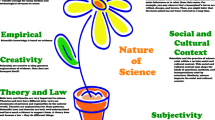Abstract
The Southwest Regional Laboratory, through major funding from the National Science Foundation (ESI-9450235), has developed a series of eight instructional modules for use in common secondary school physical science that address three central goals of U.S. science literacy education: (1) to motivate students who have previously shown little interest in science; (2) to accomplish deep change in students' internalized conceptions of the structure and workings of the physical world; and (3) to build greater understanding, in both teachers and students, of the process and culture of scientific activity.
Beginning with a discussion of the conceptual scaffolding that undergirds the project's pedagogical approach, the paper presents an overview of MindWorks' goals, the materials that have been developed to achieve these goals, and the progress of the pilot implementation and project evaluation.
Similar content being viewed by others
REFERENCES
Ahlgren, A. & Walberg, H. J.: 1973, ‘Changing Attitudes Toward Science Among Adolescents’, Nature 245, 187-190.
American Association for the Advancement of Science: 1990, Science for All Americans, Oxford University Press, New York.
Becker, B. J., Younger-Flores, K. & Wandersee, J. H.: 1995, ‘MindWorks: Making Scientific Concepts Come Alive’, in F. Finley, D. Allchin, D. Rhees & S. Fifield (eds.), Proceedings of the Third International History, Philosophy, and Science Teaching, Vol. 1. The University of Minnesota, Minneapolis, MN, 115-125.
Becker, B. J.: 1992, ‘Incorporating Primary Source Material in Secondary and College Science Curricula’, in K. Hills (ed.), Proceedings of the Second International Conference on the History and Philosophy of Science and Science Teaching, Vol. 1. The Mathematics, Science, Technology, and Teacher Education Group, Kingston, ON, 69-76.
Biological Science Curriculum Study & Social Science Education Consortium: 1992, Teaching About the History and Nature of Science and Technology: A Curriculum Framework. Colorado Springs, CO.
California Department of Education: 1990, Science Framework for California Public Schools: Kindergarten Through Grade Twelve. Sacramento.
Clement, J.: 1983, ‘A Conceptual Model Discussed by Galileo and Used Intuitively by Physics Students’, in D. Gentner & A. Stevens (eds.), Mental Models, Lawrence Erlbaum, Hillsdale, NJ, 325-340.
Driver, R. & Easley, J.: 1978, ‘Pupils and Paradigms: A Review of Literature Related to Concept Development in Adolescent Science Students’, Studies in Science Education 5, 61-84.
Gagné, Robert: 1977, The Conditions of Learning, Holt, Rinehart, and Winston, New York.
Hickman, F. M., Patrick, J. J. & Bybee, R. W.: 1987, Science/Technology/Society: A Framework for Curriculum Reform in Secondary School Science and Social Studies. Social Science Education Consortium, Boulder, CO.
Holton, G.: 1978, ‘On the Educational Philosophy of the Project Physics Course’, in G. Holton (ed.), The Scientific Imagination: Case Studies, Cambridge University Press, Cambridge, MA.
Klopfer, L. E. & Cooley, W. W.: 1963, ‘The History of Science Cases for High Schools in the Development of Student Understanding of Science and Scientists’, Journal of Research in Science Teaching 1, 33-47.
Klopfer, L. E. & Cooley, W. W.: 1961, The Use of Case Histories in the Development of Student Understanding of Science and Scientists, Harvard University Press, Cambridge, MA.
Klopfer, L. E.: 1969, ‘The Teaching of Science and the History of Science’, Journal of Research in Science Teaching 6, 87-95.
Krashen, Stephen: 1982, Principles and Practice in Second Language Acquisition, Pergamon, Oxford.
Matthews, M. R.: 1992, ‘History, Philosophy, and Science Teaching: The Present Rapprochement’, Science & Education 1(1), 11-47.
McAleese, R. (ed.): 1978, Perspectives on Academic Gaming and Simulation 3: Training and Professional Education, Kogan Page, London.
McCloskey, M.: 1983, ‘Intuitive Physics’, Scientific American 248, 122-130.
National Research Council: 1996, National Science Education Standards. National Academy Press, Washington, D.C.
Russell, A. & Curtin, T. R.: 1993, Study of School Uses of Television and Video: 1990–1991 School Year, Corporation for Public Broadcasting, Washington, D.C.
Schank, R. & Abelson, R.: 1977, Scripts, Plans, Goals and Understanding, Lawrence Erlbaum, Hillsdale, NJ.
Southwest Regional Laboratory: 1996, MindWorks. Los Alamitos, CA.
Strike, K. A. & Posner, G. J.: 1992, ‘A Revisionist Theory of Conceptual Change’, in R. A. Duschl and R. H. Hamilton (eds.), Philosophy of Science, Cognitive Psychology, and Educational Theory and Practice, SUNY Press, Albany, 147-176.
Wandersee, J. H.: 1992, ‘The Historicality of Cognition: Implications for Science Education Research’, Journal of Research in Science Teaching 29(4), 423-434.
Wandersee, James H., Mintzes, Joel J. & Novak, Joseph D.: 1994, ‘Research on Alternative Conceptions in Science’, in Dorothy Gabel (ed.), Handbook of Research on Science Teaching and Learning, Macmillan, New York, 177-210.
Welch, W. W.: 1973, ‘Review of the Research and Evaluation Program of Harvard Project Physics’, Journal of Research in Science Teaching 10(4), 365-378.
White, Richard T.: 1995, ‘Thoughts for Ph.D. Research’, Subject Matter and Conceptual Change Newsletter 23, 5.
Author information
Authors and Affiliations
Rights and permissions
About this article
Cite this article
Becker, B.J. MindWorks: Making Scientific Concepts Come Alive. Science & Education 9, 269–278 (2000). https://doi.org/10.1023/A:1008669823959
Issue Date:
DOI: https://doi.org/10.1023/A:1008669823959




